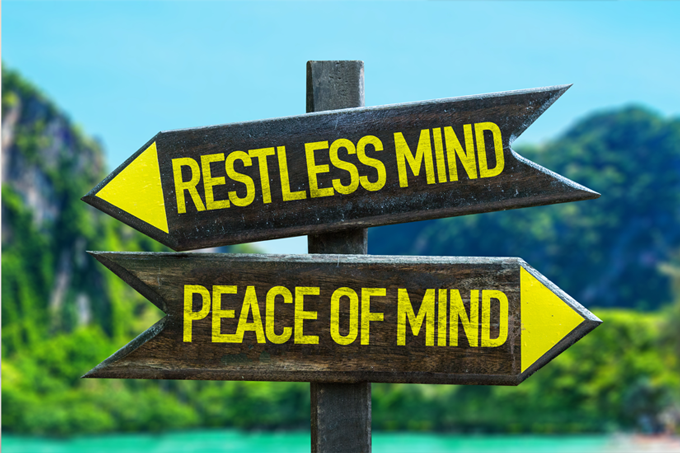How To Manage Stress!
 For most people, stress is just a fact of life.
For most people, stress is just a fact of life.
Whether it’s meeting deadlines at work, realising you are late picking the kids up from school, or something more serious like bereavement, losing your job, getting divorced, witnessing an injury, or raising children, stress is something we are all familiar with.
Stress is described as any change in the environment that elicits a response from an organism. [1]
A certain amount of stress is necessary, in order for the body to adjust and respond accordingly to any situation that is out of the ordinary.
It keeps us alert and is helpful in a variety of situations, including taking exams, at job interviews and escaping danger.
It helps us survive.
Our bodies are designed to deal with a certain amount of stress.
But excessive amounts of stress can be negative.
It can cloud our thinking and prevent us from responding in useful ways.
You know that feeling when your legs turn to jelly, your head starts spinning and you just go blank?
Each time, we swear that in future we will act calmly, we will know what to do and deal with the situation logically.
Not so easy.
The symptoms we experience when we are stressed are caused by actual chemical changes in our brains and are largely out of our control, unless we learn how to cope with stress properly.
What Happens In Your Brain
When we are stressed, a number of biochemical changes occur in our bodies.
The brain causes the release of the chemicals epinephrine, norepinephrine and cortisol from the adrenal glands.
These raise adrenaline levels, increasing the heart rate, glucose levels and oxygen delivery to the brain.
This is the mechanism that makes us respond to stress and helps us to survive in a stressful situation, but it has the added effect of inhibiting rational, logical thinking. [1] [2]

Stress Can Affect Your Health
Continued stress over a long period of time can also have a detrimental effect on our health, causing physical symptoms such as headaches, stomach pains and chest pains.
It has also been linked to a weakened immune system, and many conditions and illnesses such as high blood pressure, heart disease, diabetes, eczema, asthma, arthritis, depression and anxiety. [3]
In the case of university students, stress can be a part of daily life and can affect concentration and can prevent them from enjoying the learning process.
Depression and anxiety is alarmingly high amongst students. [4]
Something Needs To Be Done
In order for us to deal with life’s daily crises and to function more efficiently, as well as prevent its effects on our health, we must learn how to deal with stress efficiently.
Stress management activities are vital for people of all ages.

How To Deal With Stress
In order to be able to deal with stress, we must get to the root of the problem and make changes in our lives.
Time Management
A lot of our stress is time-related.
In other words, when we feel we do not have enough time to get something done, or we are going to be late, it causes us to be stressed.
This may be particularly true in the workplace, and learning to manage our time more efficiently may be a way to handle stress at work.
The fact is there IS enough time, we just need to know how to use it.
Here are a few tips on how to organise your time:
- Plan Ahead – Organise your day with approximate time slots so you can fit in work, relaxation and socialising.
- Prioritise – Carry out the most important or the more difficult tasks first, not just to make sure they are completed, but also while your energy levels are at their peak!
- Avoid Putting Things Off – As the saying goes, never leave for tomorrow what you can do today.. your tasks will only pile up.
- Don’t be a perfectionist – This is just a waste of time. Do your best and come back to it later if you have time.
- Everything Should Have A Place – Having a designated place for everything, especially things that we commonly misplace like keys, passports, suitcase padlocks, reading glasses, will save a lot of time. Searching for things is THE biggest time-waster! [5] [2]
- Email/Text messaging – What did we do before the age of email and smart phones?? Nowadays, we should have tonnes more time in the day for everything..when was the last time you trudged to the post-office to send mail like your parents used to? And no need to waste time speaking on the phone to get a quick message to someone.
Physical Exercise
Exercise is one of the best strategies for managing stress and calming anxiety.
It improves the body’s ability to use oxygen and also increases blood flow to all the organs of the body, making them function more efficiently.
All this has a direct and positive effect on the brain, increasing its production of endorphins.
Endorphins are the chemicals in our brain that are responsible for positive feelings and happiness.
They can help relieve tension, anxiety, anger, and mild depression that is often associated with stress.
As well as relieving stress, exercise has also been shown to improve the quality of sleep and boost confidence levels, as well as simply taking one’s mind away from their worries.
Often, focusing on a single physical task can produce a sense of energy and optimism, similar to the effects of meditation. [7]
Recommended physical activities include cycling, jogging/running, walking, hiking, water sports, and aerobic classes.
Of course, the more you can do outdoors the better, as nothing can beat fresh air!
HIIT exercise is one of the best types of exercise and aligns itself with ancient medicine principles.
Relaxation Techniques
Practicing relaxation techniques can relieve stress symptoms and muscle tension by slowing the heart rate and breathing rate, lowering blood pressure, increasing blood flow around the body, improving concentration and mood, and reducing anger and frustration, as well as boosting confidence.
A healthy mind is a strong mind.

- Meditation
- Yoga
- Tai chi
- Massage
- Hypnosis
- Writing/Journaling
- Music and Art Therapy
- Deep Breathing Techniques
Don’t be put off if you don’t feel the benefits straight away.
Relaxation, just like exercise, takes practice.
And if one technique doesn’t suit you, try another. [8]
If you allow it to, stress can take over your life. But there are ways to control it, you just have to find the right way for you.
Until next time,
Yours in Health
From the Team at Unique Health and Wellness
Would you like to find out more?
References:
[1].britannica.com/topic/stress-psychology-and-biology
[2]ted.com/talks/daniel_levitin_how_to_stay_calm_when_you_know_you_ll_be_stressed
[3]webhp?sourceid=chrome-instant&ion=1&espv=2&ie=UTF-8#q=webmd+stress&*
[4]sciencedirect.com/science/article/pii/S1877042811018611
[5]mindbodygreen.com/0-15308/7-time-management-tricks-to-reduce-your-stress.html
[6]webmd.com/balance/stress-management/stress-management-relieving-stress#1
[7]mayoclinic.org/healthy-lifestyle/stress-management/in-depth/exercise-and-stress/art-20044469
[8]mayoclinic.org/healthy-lifestyle/stress-management/in-depth/relaxation-technique/art-20045368?pg=2
The information provided does not take into account individual needs of any particular person. When providing this information, it is intended as a sharing of knowledge and information from the research. The information provided should not be construed as personal medical advice or instruction and is not intended to replace a one-on-one relationship with a qualified health care professional and is not intended as medical advice. We encourage you to make your own health care decisions based upon your research and in partnership with a qualified health care professional.
STATEMENT OF AFFILIATION:
Unique Health and Wellness Australia is affiliated with InnerOrigin with the intention of selling non-therapeutic goods which enhance health and wellbeing. These are ancillary products which will not compromise therapeutic goals. InnerOrigin also sells TGA approved therapeutic goods, however we actively discourage our clients from substituting their prescribed natural medicines with these products. Our financial interest in InnerOrigin will therefore not influence the quality of care we provide to our clients. Our high standard of care for our clients is always our first priority.

MORE BLOG STORIES
Breaking Down the B Vitamins
Amazing Ways to Help Heal Mitochondrial Dysfunction!
The 5 Worst Foods For Your Gut
‘THE GOLDEN GODDESS’
Mitochondria, Inflammation and Oxidative Stress
Tired? You May Be Suffering From Mitochondrial Dysfunction